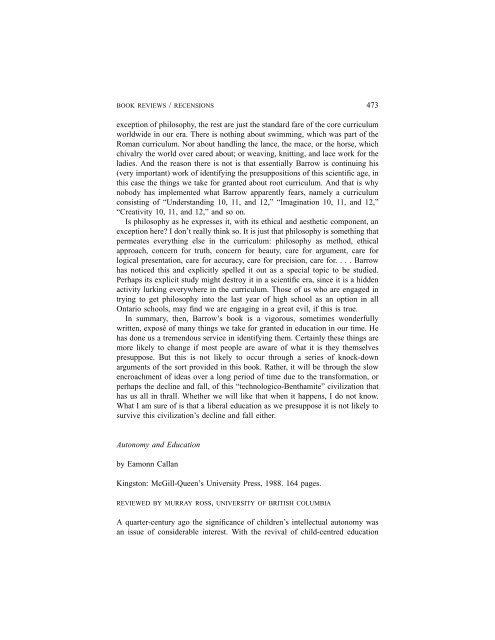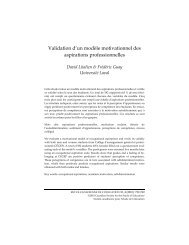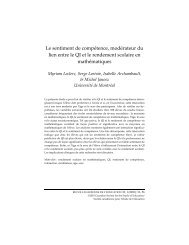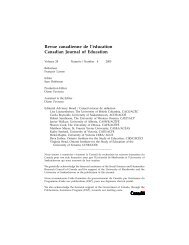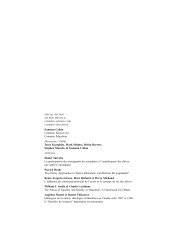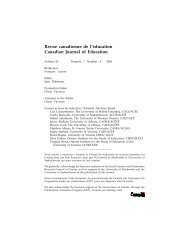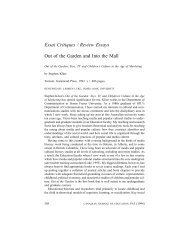Mireille Falardeau et Michel Loranger Le choix de stratégies ... - CSSE
Mireille Falardeau et Michel Loranger Le choix de stratégies ... - CSSE
Mireille Falardeau et Michel Loranger Le choix de stratégies ... - CSSE
You also want an ePaper? Increase the reach of your titles
YUMPU automatically turns print PDFs into web optimized ePapers that Google loves.
BOOK REVIEWS / RECENSIONS 473<br />
exception of philosophy, the rest are just the standard fare of the core curriculum<br />
worldwi<strong>de</strong> in our era. There is nothing about swimming, which was part of the<br />
Roman curriculum. Nor about handling the lance, the mace, or the horse, which<br />
chivalry the world over cared about; or weaving, knitting, and lace work for the<br />
ladies. And the reason there is not is that essentially Barrow is continuing his<br />
(very important) work of i<strong>de</strong>ntifying the presuppositions of this scientific age, in<br />
this case the things we take for granted about root curriculum. And that is why<br />
nobody has implemented what Barrow apparently fears, namely a curriculum<br />
consisting of “Un<strong>de</strong>rstanding 10, 11, and 12,” “Imagination 10, 11, and 12,”<br />
“Creativity 10, 11, and 12,” and so on.<br />
Is philosophy as he expresses it, with its <strong>et</strong>hical and aesth<strong>et</strong>ic component, an<br />
exception here? I don’t really think so. It is just that philosophy is som<strong>et</strong>hing that<br />
permeates everything else in the curriculum: philosophy as m<strong>et</strong>hod, <strong>et</strong>hical<br />
approach, concern for truth, concern for beauty, care for argument, care for<br />
logical presentation, care for accuracy, care for precision, care for. ...Barrow<br />
has noticed this and explicitly spelled it out as a special topic to be studied.<br />
Perhaps its explicit study might <strong>de</strong>stroy it in a scientific era, since it is a hid<strong>de</strong>n<br />
activity lurking everywhere in the curriculum. Those of us who are engaged in<br />
trying to g<strong>et</strong> philosophy into the last year of high school as an option in all<br />
Ontario schools, may find we are engaging in a great evil, if this is true.<br />
In summary, then, Barrow’s book is a vigorous, som<strong>et</strong>imes won<strong>de</strong>rfully<br />
written, exposé of many things we take for granted in education in our time. He<br />
has done us a tremendous service in i<strong>de</strong>ntifying them. Certainly these things are<br />
more likely to change if most people are aware of what it is they themselves<br />
presuppose. But this is not likely to occur through a series of knock-down<br />
arguments of the sort provi<strong>de</strong>d in this book. Rather, it will be through the slow<br />
encroachment of i<strong>de</strong>as over a long period of time due to the transformation, or<br />
perhaps the <strong>de</strong>cline and fall, of this “technologico-Benthamite” civilization that<br />
has us all in thrall. Wh<strong>et</strong>her we will like that when it happens, I do not know.<br />
What I am sure of is that a liberal education as we presuppose it is not likely to<br />
survive this civilization’s <strong>de</strong>cline and fall either.<br />
Autonomy and Education<br />
by Eamonn Callan<br />
Kingston: McGill-Queen’s University Press, 1988. 164 pages.<br />
REVIEWED BY MURRAY ROSS, UNIVERSITY OF BRITISH COLUMBIA<br />
A quarter-century ago the significance of children’s intellectual autonomy was<br />
an issue of consi<strong>de</strong>rable interest. With the revival of child-centred education


